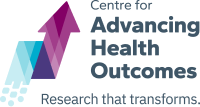|
The following content was published on behalf of the Centre for Advancing Health Outcomes |
Guest Post: Please share your experiences as a pharmacist providing care for people with opioid use disorder
If you provide care for individuals with opioid use disorder (OUD), or have any thoughts about pharmacists providing this type of care, we want to hear from you! We are researchers from the Centre for Advancing Health Outcomes at St. Paul’s Hospital in Vancouver. We are currently conducting a project titled, Exploring pharmacists’ perspectives on improving care for people with opioid use disorder, that is funded by the Ministry of Health Seed Research Grant. The purpose of this project is to identify the facilitators and barriers pharmacists experience when providing care for individuals with OUD.
In BC, approximately one-third of those diagnosed with OUD receive opioid antagonist treatment (OAT) (Piske et al., 2020), meaning less than half of the 100,000 people who qualify for OAT treatment are accessing it (Min et al., 2020). Moreover, there are various barriers to retraining those who start treatment due to factors such as mental and physical health challenges (Speed et al., 2018; Levis et al., 2021). Access to care is also constrained by social and socioeconomic factors, such as stigma, limited education on OUD care, and medication costs (Mackey et al., 2020). To help address this gap, we aim to develop recommendations that can improve pharmacists’ ability to support people accessing care for OUD. The underlying premise of our work is that pharmacists who provide care for people with OUD are best placed to understand the challenges that they experience in providing these services. However, pharmacists may not have had the opportunity to internally consider or externally articulate these experiences.
This project has three aims. First, we will explore pharmacists' perceptions of providing care for people who use opioids. This includes factors such as pharmacists’ ability to provide different types of care and wrap-around services, the client-pharmacist relationship, and additional supports pharmacists require. Second, we will identify barriers and facilitators in the work environment that influence these perceptions. Third, based on the above findings, we will provide preliminary recommendations to the Ministry to support pharmacists’ ability to provide care for people living with OUD.
Participation in the study involves completing a 1-hour interview. The interview will take place remotely over Zoom and you will be compensated $30 for your time. If you have any questions about the study, please contact us at [email protected]
If you are interested in participating, please follow this link https://ubc.ca1.qualtrics.com/jfe/form/SV_eXoABskxdIPGHEa to complete an eligibility survey. We will only contact you if you are eligible. If we contact you, we will share study details and procedures, provide you with a consent form to review, and schedule an interview time.
Thank you for your interest in supporting our research!
About the Author

The Centre for Advancing Health Outcomes is a multidisciplinary health research centre that bridges research and clinical practice. Advancing Health is jointly affiliated with Providence Research and the University of British Columbia (UBC) Faculty of Medicine and is housed at St. Paul’s Hospital in Vancouver. The Centre supports twelve research programs, including the Knowledge Translation Program led by Dr. Adam Easterbrook. This program collaborates with health care decision-makers, administrators, clinicians, patients, and researchers to promote and enhance evidence-based policy, practice, and evaluation across the health system.